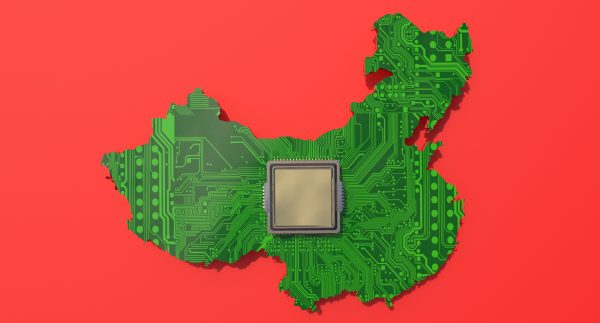During a quiet summer for Chinese politics, one part of the political machinery has been conspicuously active: the Central Commission for Discipline Inspection (CCDI). Since mid-July, the Chinese Communist Party (CCP)’s anti-graft agency has probed at least eight senior executives in China’s semiconductor industry, all linked to the China National Integrated Circuit Industry Investment Fund, nicknamed the “Big Fund.”
Among the executives being investigated are Ding Wenwu (a former Big Fund president), Diao Shijing (a former Big Fund chairman), and Zhao Weiguo (a former chairman of Big Fund portfolio company Tsinghua UniGroup). Several former employees of Sino IC Capital (the Big Fund’s managing entity) were also placed under investigation.
Meanwhile, Beijing has purged Xiao Yaqing, formerly head of the Ministry of Industry and Information Technology (MIIT), where Diao and Ding were once officials. Xiao became the first sitting minister to be investigated for many years, and the biggest “tiger” to fall ahead of this year’s 20th National Party Congress.
According to statements by the CCDI, the executives are all suspected of “serious violations of discipline and laws,” a euphemism for corruption, while Xiao received the lesser charge of “violations of discipline and laws.” Collectively, these investigations constitute the first major crackdown on the Chinese chipmaking industry.
Over the last decade, huge amounts of capital have flowed into Chinese chipmaking, with relatively loose oversight creating ample room for official corruption. As Caixin reported, Big Fund managers have long been rumored to embezzle funds from their portfolio companies.
But Beijing first raised concerns about the semiconductor sector back in 2020. So why have these probes only come about now? The answers may lie in concurrent domestic and international events.
Geopolitical Tensions
The controversial visit by U.S. House Speaker Nancy Pelosi to Taiwan, where she met the world’s most advanced semiconductor manufacturers, came in the middle of the ongoing crackdown on China’s chip industry. And while this timing is surely coincidental, the trip exposed a major sore point for Beijing: China’s continued reliance on foreign silicon leaves it in a vulnerable geostrategic position.
After the Trump administration introduced restrictions on chip exports in 2020, Huawei’s global smartphone business was devastated. And the Biden administration has only tightened the screws on China’s access to foreign semiconductor technology. Biden recently signed the CHIPS Act to advance U.S. industrial policy in the sector and is reported to be building a “Chip 4 Alliance” together with Taipei, Seoul, and Tokyo.
In short, there is a growing geostrategic urgency for Beijing to advance its indigenous semiconductor capabilities. Yet despite some successes, like the Semiconductor Manufacturing International Corporation (SMIC), Big Fund investments have failed to meaningfully reduce China’s reliance on imported technology.
This failure is likely a major driver of the crackdown, and the former Big Fund executives might be the fall guys, according to analyst Jordan Schneider.
Domestic Politics
Apart from geopolitics, the timing of domestic political events is also notable. This crackdown has been launched during a Party Congress year, when it is customary for political infighting to intensify and for undesirable elements to be purged from the system.
Recent months have seen a barrage of state media reporting on what different sectors and regions have achieved “since the 18th Party Congress” (read: when Xi Jinping came to power). But China’s semiconductor industry, overseen by the MIIT, has clearly not produced the sort of headline achievements that make propaganda writers happy.
On the contrary, the industry has been blighted by several high-profile failures, including Tsinghua UniGroup, which had to be bailed out this year after a prolonged insolvency crisis. Another debacle was the 2020 collapse of Wuhan Hongxin Semiconductor Manufacturing; its executives reportedly absconded after racking up debts of $19.6 billion and producing little but an unfinished concrete shell.
This year’s political transition offers a natural juncture at which the party-state can seek to address such failures and reshuffle the people in charge of chipmaking. The crackdown also signals that Beijing will change how it develops and regulates the semiconductor sector in the future.
Regulatory Tightening
In recent years, Chinese regulators have launched numerous campaigns against perceived capitalist excesses, mostly targeting private companies in non-strategic areas of the economy. But the probes into semiconductor executives are remarkable for targeting a sector that is state-led and highly sensitive.
To date, over $50 billion of investment has been channeled through the Big Fund, and at least $25 billion through 15 local government funds. Unsurprisingly, these inflows and other financial support measures have bred large-scale wastage and corruption. 2021 saw a huge increase in new chipmakers, many of which were suspected of being fraudulent.
It is precisely this sort of “disorderly capital expansion” that Xi Jinping’s government has railed against in other technology segments. Such huge inefficiencies might have been excusable in the 2010s, when Chinese chipmaking was just starting to develop. But the current fiscal conditions are much less favorable, especially at the local level.
With this crackdown on semiconductor executives, it should be clear that no sector will be spared from Xi’s attempts to regulate capital. The goal of advancing China’s long-term national interests ultimately trumps the risk of short-term industry disruption.
Whither Chinese Chipmaking?
From here, China will continue to pour money into its semiconductor sector, but likely in a way that is more cautious and tightly regulated than before. Precedent in other developing segments, like new energy vehicles, suggests that chipmaking will start to consolidate around larger champions, such as SMIC.
The MIIT may also favor greater government ownership over the semi-marketized approach that has characterized Big Fund investments. In particular, Xiao’s successor Jin Zhuanglong could draw on the successes of China’s aerospace sector, where he built his career. It is a fitting profile for the man who now will lead China’s modern-day “space race.”


